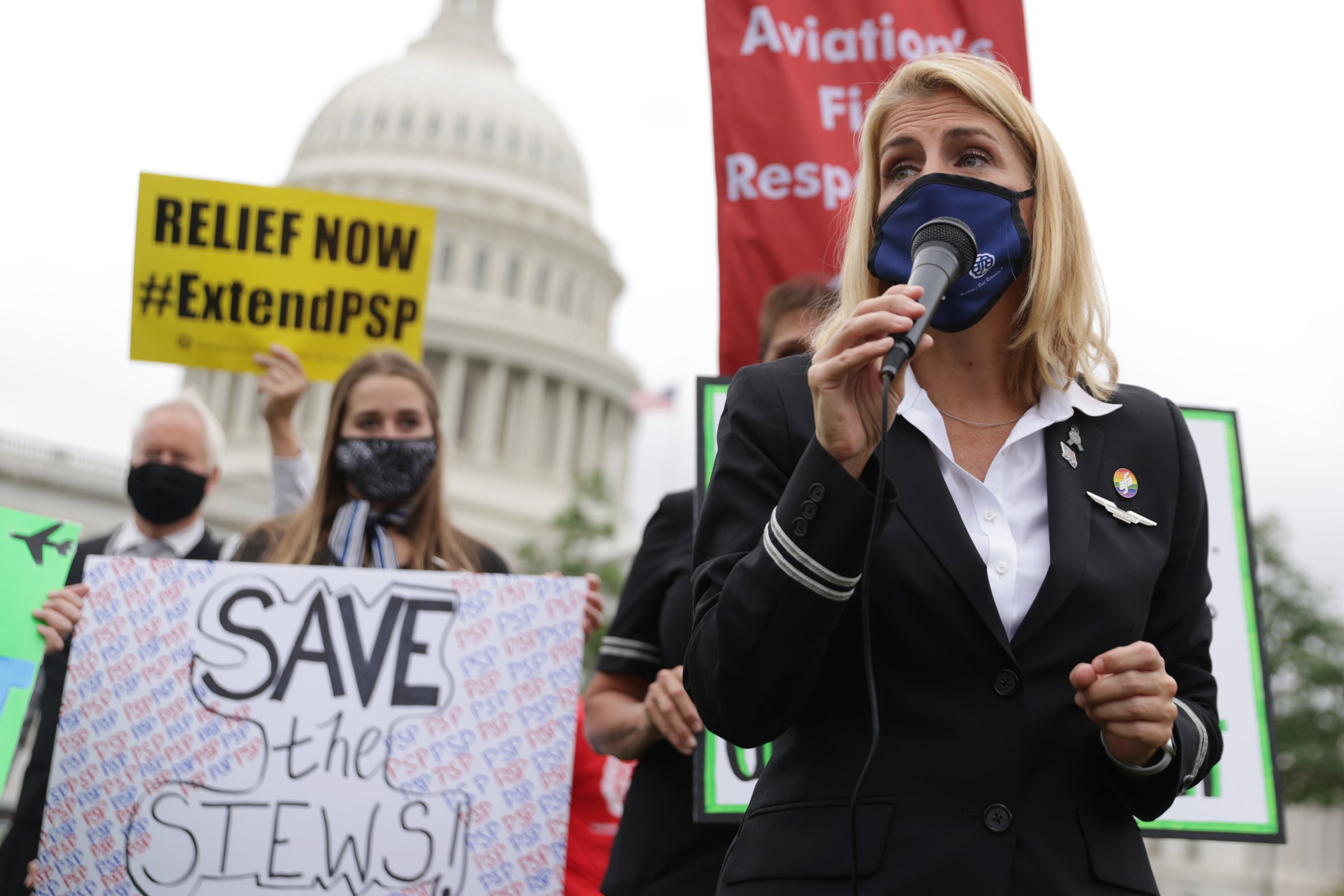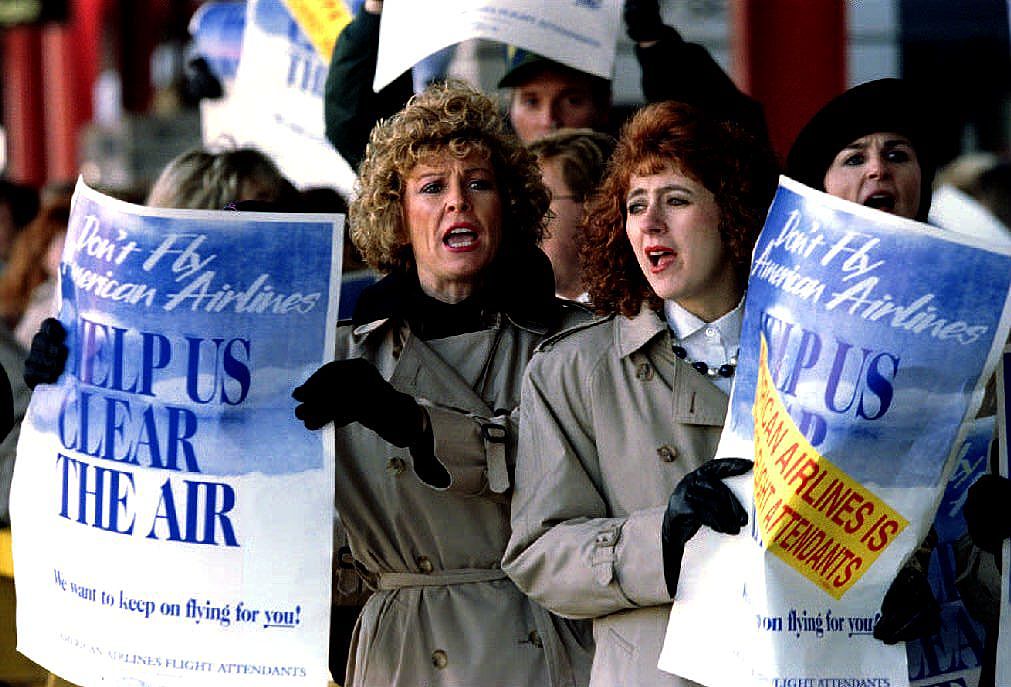
When Sara Nelson, president of the Association of Flight Attendants, started to emerge as the most dynamic labor leader in years, issuing calls to arms for workers all over the country, it was newsworthy. The new face of the labor movement was…a flight attendant? Appearing on television and on picket lines, often dressed in her United Airlines uniform, Nelson was not exactly what most people thought of when they imagined a militant union leader.
But, as I learned while researching my new book, The Great Stewardess Rebellion, flight attendants have been at the forefront of the labor movement for decades. Back in the 1960s and 70s, flight attendants used their unions to make huge change in their workplace, including eliminating the “no marriage” rule (until the mid-1960s, flight attendants were fired when they wed) and the age limits (most airlines fired flight attendants at 32). These changes had a wider impact, too, opening doors for women workers across the United States in all sorts of industries. And flight attendants have been at the vanguard of the labor movement ever since. In 1993, when almost 21,000 American Airlines flight attendants went on strike, TIME and others described them as the new face of labor.
Today, flight attendants are still leading the way. In the United States, they are virtually all unionized, and have been for more than half a century. Except at Delta Airlines. But that might be about to change.
Right now there’s a major union drive going on to bring the flight attendants at the country’s second-largest airline into AFA, which currently has around 50,000 members. About 24,000 flight attendants work for Delta, a huge group of workers. Delta has been fighting the drive with all it’s got—the company makes no secret of its distaste for unions—but for possibly the first time, unionization seems like a real possibility.
Read more: U.S. Labor Unions Are Having a Moment
What’s different now? AFA has tried to organize Delta flight attendants three times in the last two decades, and lost the vote each time. But, Nelson told me, this time is different. First, she points to the changing political landscape. The labor movement is in the news now more than it’s been in years, with workers at Starbucks, REI, and Amazon forming unions. The pandemic, she added, has sparked a new awareness of how important it is to have a voice on the job. And finally, Nelson says, “The biggest thing that’s different about this campaign is that’s really being driven and fueled by the next generation. It’s not as if we don’t have people who have been around for decades involved, but the activists who are working on it day in and day out, putting in real time, putting their faces out there and working hard on this is the next generation.”
The current state of the industry has had an effect, too. Passengers who refused to wear masks, who went so far as to scream at or even punch flight attendants, have been in the news almost daily. Last year the Federal Aviation Administration recorded 5,981 unruly passenger incidents. Plus, COVID is keeping sick workers at home, so others have to pick up the slack. Working as a flight attendant has rarely been harder than it is right now. Nelson says that these working conditions are certainly playing a part. “It’s a different environment, and it’s combative. And that is unsettling. [Flight attendants] weren’t necessarily assigning blame to Delta, but when it’s unpleasant like that, then you’re looking for support. And if you feel like you’re not getting it, that’s a problem.” But, she added, Delta policies are also to blame. Just before the pandemic Delta made a sudden change to its pay policy, instituting a bi-weekly system that Nelson says wreaked havoc on flight attendants by reducing flexibility to construct their own schedules—something many flight attendants counted on. In 2018, some flight attendants discovered that the new Delta uniforms were causing rashes and hives; there were allegations that the company tried to disguise the extent of the problem. And earlier this month, Delta sent an announcement of their purpose-built anti-union website to members of Congress. “Delta has a long track record of driving change based on your feedback – without AFA,” the website says.
When flight attendants in the 1960s and 70s banded together to fight back against sexist policies (in addition to getting rid of automatic termination upon pregnancy, marriage, or turning 32, they make myriad smaller changes, too—eliminating mandatory high heels, for example, something important when you might clock up 8 miles in a single shift!), they were setting the groundwork for decades of activism. They fought —and won—battles for basic equality. Today, the stakes are different. Now, men work the cabin, girdles are no longer required, and flight attendants can wear glasses (yes, all those things were banned in the past). I asked Nelson why it was so important to organize Delta. A win of 24,000 flight attendants would be a huge feather in the cap of the labor movement, but her goals are bigger.

“Fundamentally unions were formed to take on the bigger issues that individual workers could never take on. We wouldn’t have social security, we would never have had pensions or any other means to save for retirement without unions,” she pointed out. “We bargain in our workplaces first, oftentimes, to break through on these ideas, but if we don’t keep organizing we’re never going to address the big issues of today. Student debt, housing, healthcare, a secure retirement…all of the existential threats and all of the big issues that matter to working people across this country, no matter what state they’re in, no matter where they work—those things are only going to be solved if we organize.”
Whether or not AFA wins at Delta this time, any vote is another step forward for a labor movement that’s been seeing a renaissance in recent years after decades of stagnation, a sign of the changing times, and workers’ renewed determination to get a seat at the table. And flight attendants will, as usual, be right there leading the way.
More Must-Reads From TIME
- The 100 Most Influential People of 2024
- Coco Gauff Is Playing for Herself Now
- Scenes From Pro-Palestinian Encampments Across U.S. Universities
- 6 Compliments That Land Every Time
- If You're Dating Right Now , You're Brave: Column
- The AI That Could Heal a Divided Internet
- Fallout Is a Brilliant Model for the Future of Video Game Adaptations
- Want Weekly Recs on What to Watch, Read, and More? Sign Up for Worth Your Time
Contact us at letters@time.com